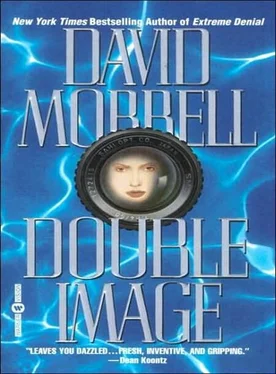Her hands more unsteady, the elderly woman again raised the earth-colored cup to her lips, drinking, then slowly setting it down.
WHEN SHE WAS SEVENTEEN, she said, the village was so isolated that Acapulco was a three-day trek along a snake-infested trail through the rain forest. Outsiders were unheard of. Then the first stranger she had ever met – and the first gringo – sailed into the harbor.
“He was amazingly tall. His leanness emphasized his height. But what I noticed most were his oddly handsome face, his shock of black hair, and his eyes, which never stopped searching.”
“Randolph Packard,” Coltrane said.
Esmeralda nodded. “He told us that he planned to live near the village, that he wanted to be a good neighbor, that he had brought us gifts of clothing, tools, and medicines. He would pay us generously to work for him, he said. So the corruption began. Each year after the rainy season, he returned. In the meantime, we built his estate up there, tended his gardens, kept everything clean and in repair, flowers in vases, fresh linen on the beds, ready on a moment’s notice for when the sails of his sleek boat would reappear, approaching the harbor. We grew dependent on him. If he was late, we worried that he might not come at all. Without the money, goods, and medicines he brought, we knew we would suffer.”
One year, Packard didn’t come alone. He brought many other boats and an army of gringos who unloaded electrical generators, cameras, lights, sound equipment, sets, tents, an invasion of movie equipment that the locals knew nothing about and that caused chaos within the village. Along with the invasion came more money and luxuries than they had ever seen. The corruption worsened. Esmeralda hated all of it. With one exception – an actress, the most beautiful woman she had ever seen, to whom she was assigned as a maid.
Esmeralda’s wrinkled gaze lingered on the face in the yellowed photographs on the table. She redirected it toward Tash, reverential, as if Rebecca Chance sat before her.
It soon became clear, she said, that the reason Packard had brought the movie company to the village was to ingratiate himself with Rebecca, to put her in debt to him for going to such extremes to advance her career. At the same time, it also became clear that Packard had a rival for Rebecca’s affections – the film’s producer, Winston Case.
The name brought Coltrane and Tash to greater attention.
Esmeralda learned about Rebecca’s situation because the actress, who spoke Spanish, confided in her. Winston Case had produced Rebecca’s previous three films. They had formed a close professional and personal relationship. Knowing her struggle to rise within the film industry, he had even given her a house that he owned in Los Angeles. She was indebted to him. But at the same time she was attracted to Randolph Packard, whom she had met one day when she discovered him photographing her house. A conversation had led to a dinner, then other dinners, then weekend outings. His flamboyance and wit had been irresistible.
Esmeralda felt helpless, watching the two men vie for Rebecca’s attentions, seeing how Rebecca was torn between them. But Esmeralda wasn’t the only one who noticed, for the film crew and the actors soon realized that their work was secondary to the greater drama developing behind the scenes. Several times, Winston Case and Randolph Packard exchanged angry words in front of the company. Packard wanted to take photographs of her whenever she wasn’t working. Winston Case wanted her to spend every evening with him. Their persistence so wore her down that she finally demanded that they both leave her alone, and there the matter remained when the film was finished and the cast and crew returned to Los Angeles, including Rebecca, who accompanied Winston Case, while Packard followed her.
“I never expected to see Rebecca again,” Esmeralda said, “but the boat came back in less than a year, Rebecca and Packard, no one else. To my delight, I was asked to be Rebecca’s maid again, but my delight became worry when Rebecca told me that she had not come willingly, that Packard had invited her onto his boat for a weekend cruise and then had kept sailing, refusing to let her off. Escape through the snake-infested jungle was out of the question. But Rebecca vowed to get away and prayed for someone else’s boat to enter the harbor.”
Meanwhile, she pretended to be sympathetic to Randolph’s attentions. To keep him from suspecting her plans, she let him photograph her. To further confuse him, she submitted to the indignity of agreeing to remove her clothes before his camera. But after a few weeks in which no opportunity for escape presented itself, a new source of tension afflicted her – because changes in her body made it obvious that she was pregnant.
Esmeralda’s first thought was that Randolph had forced himself upon her, but Rebecca confessed that in a moment of weakness and passion she had given herself to Winston Case. It had been Packard’s suspicion about their intimacy that had driven him to abduct her. Now the growing evidence of that intimacy made Rebecca fearful for the baby’s safety, an apprehension that seemed justified when approaching sails made Randolph lock her away.
The boat that entered the harbor belonged to Winston Case, who had finally suspected where she was. But when he hurried up to the estate, he found that Packard had hired a dozen men from the village to guard the property and keep him from getting inside. Reduced to staying in the village, he gazed up longingly at the estate, his only consolation the messages that Esmeralda brought whenever Rebecca sent her on an errand into the village.
The rainy season arrived as Rebecca’s pregnancy reached its term. Winston waited for Rebecca to regain her strength while the baby, a daughter, became strong enough to travel. Then, with Esmeralda’s help in relaying messages, Winston used the cover of an evening storm to sneak past the guards. He hid until the storm cleared and the estate was in darkness, then used a club to overcome a guard sleeping outside Rebecca’s room.
Immediately, Rebecca was at the window. She handed the baby to him, climbed out, and rushed after him through the darkness toward a path that zigzagged down from the cliff to the harbor. Winston had hidden a lantern behind the rock formation, but before he could light it, the baby started to cry, and Packard, who had not yet fallen asleep, burst from the house, shouting for help, racing toward the cries from the baby.
He caught them at the rock formation. Winston still held the baby, but either Packard didn’t realize it or else he didn’t care, because he kept shoving at Winston, causing Rebecca to scream in protest. She lunged between the two men and reached for the baby, but Packard kept shoving, and the next thing, Rebecca’s scream was one of fright as she plummeted over the edge, vanishing into the darkness, her scream ending on the surf-pounded rocks far below.
Packard couldn’t move. Anguished, he gaped downward for the longest time, then wailed. By the time the guards arrived, Winston had scrambled down the path with the baby.
ESMERALDA’S GAZE RETURNED FROM A FARAWAY PLACE. She cast another look at the yellowed photographs on the table in the flower garden, then shook her head and glanced toward Tash.
“I was waiting at the bottom. I asked where Rebecca was. He didn’t answer, just kept urging me toward the rowboat that would take us out to his sailboat. While I held the baby, he pulled at the oars with a strength that I never would have dreamed he possessed. By the time we reached the sailboat, we heard Packard and his guards on the beach. They jumped into fishing boats to chase us. But Winston raised his sails and disappeared into the darkness before they came close.”
Читать дальше












